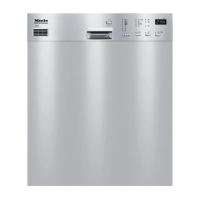Items not suitable for
dishwashers:
–
Wooden cutlery and crockery or
items with wooden parts: these may
discolour and fade. The glue used in
these items is not dishwasher-proof
and wooden handles may come loo
-
se after being washed in a dishwas
-
her.
–
Craft items, antiques, valuable vases
and decorative glassware are also
not suitable for dishwashers.
–
Plastic items which are not heat re
-
sistant. The high temperatures in the
dishwasher may cause them to melt
or lose shape.
– Copper, brass, tin and aluminium
items may discolour or become matt.
– Colours painted over a glaze may
fade after a number of washes.
– Clouding may occur on glasses after
frequent washing. Do not wash deli-
cate glassware, or glassware contai
-
ning lead crystal in a dishwasher.
We recommend:
–
When purchasing new crockery and
cutlery, make sure they are dishwas
-
her-proof.
–
If delicate glassware is washed in the
dishwasher ensure that only very low
temperatures are used (see pro
-
gramme chart). This will reduce the
risk of clouding.
–
Wash particularly delicate glassware
by hand.
Please note
Silverware previously cleaned with a
silver polish may still be damp or spot
-
ted at the end of a programme, where
water has not run off smoothly. It may
need rubbing dry with a soft cloth. Sil
-
ver treated in a silver immersion dip is
usually dry at the end of a programme
but may tarnish.
Silver which has been in contact with
foods containing sulphur can discolour.
These include egg yolk, onions, mayon
-
naise, mustard, pulses, fish, fish brine
and marinades.
,
Aluminium components (e.g.
grease filters) must not be cleaned
with caustic alkaline commercial or
industrial cleaning agents. These
may damage the material, or in ex-
treme cases, cause a severe chemi-
cal reaction.
Loading the dishwasher
24

